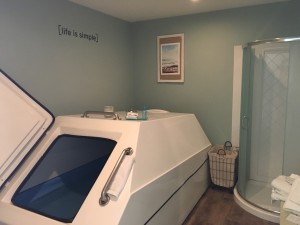WASHINGTON —Each week, dozens of the capital region’s stressed out and work-weary head to Hope Floats in Bethesda, Maryland, where they hope to make their cares float away — literally.

The spa is one of a growing number of locations offering what’s known as flotation therapy. In the name of relaxation, practitioners spend at least an hour floating naked (bathing suits are an option) in a pod filled with salt-infused water. The pod is completely dark and silent.
“I kind of felt like I was entering my mother’s womb again,” said Bethesda resident Kimberly Boone, describing how it felt the first time she got in the tank.
Boone started doing flotation therapy back in 2012. She says she was in a dark place at the time, recovering from alcohol and drug addictions. She was looking for an alternative way to deal with anxiety and depression. She opened the business in 2013.
“Doctors prescribe pills or whatever just to get you to feel, deal — get through a day,” said Boone. “For me it became floating.”

Flotation therapy is getting more national attention thanks to high-profile endorsements from elite athletes — Steph Curry and Tom Brady are known floaters. A float spa has recently set up shop in Frederick, Maryland. There also are spas in Baltimore and Annapolis.
Costs for an hour-long session at D.C.-region spas range between $60 and $80.
“People are looking for holistic methods to disconnect,” says Lynette Darco, business manager at Hope Floats. “We’re all so connected 24 hours a day.”
The inside of the tank is small, about twice the width of a typical bathtub. But it’s tall and long enough to enable a single person to float without feeling smothered.
It’s filled with a mixture of water and Epsom salt —just enough for buoyancy, since you’re not completely submerged.
The temperature of the air and water are meant to match your body temperature — which can wig out first-timers. “They’re like, ‘is my arm in the water or not?’” Darco said. “Of course they look, but they’re in darkness and can’t see.”
Darco and Boone said that the disorientation eventually subsides. You’ll leave the tank feeling like you got a complete mind reboot, they said.
“For me, it’s a way of life at this point,” Boone said.






